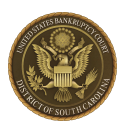United States citizens are being targeted through various methods of communication, including phone calls, emails, and mail correspondence. Some of the recent scams involve asking citizens to send money, provide more information in relation to fake “IRS case numbers,” or come to court for jury service. The fraudulent schemes may extend to other requests or demands as well.
To protect themselves from these scams, citizens should always ensure that communications are official communications from the court. Email communications will always come from an official court email address, and telephone communications will always come from an official court phone number. However, recently scammers have been able to spoof court personnel names and phone numbers and have used them to communicate with citizens. Accordingly, if you are unsure whether the communication is from a court employee, you should take additional steps to protect yourself. If communicating by telephone, you can end the call and initiate a new phone call to an official court phone number. If communicating by email, instead of responding to the initial communication, you may initiate a new email after ensuring you are using an official court email address.
Persons receiving suspicious telephone calls, emails, or mail correspondence allegedly from the court should not provide the requested information nor should any money, MoneyPak, cash card, Green Dot card or similar payment method be provided; instead please contact the Clerk of Court's office of the U.S. Bankruptcy Court, District of South Carolina at 803-765-5436. In addition, persons receiving such scams are encouraged to report these to the Federal Bureau of Investigation to formally document the complaint. Complaints can be submitted to the Federal Bureau of Investigation at www.ic3.gov. If fraudulent documents are received by mail, a Mail Fraud Complaint may be filed with the United States Postal Inspection Service. More information can be found at www.consumer.ftc.gov/features/scam-alerts.
